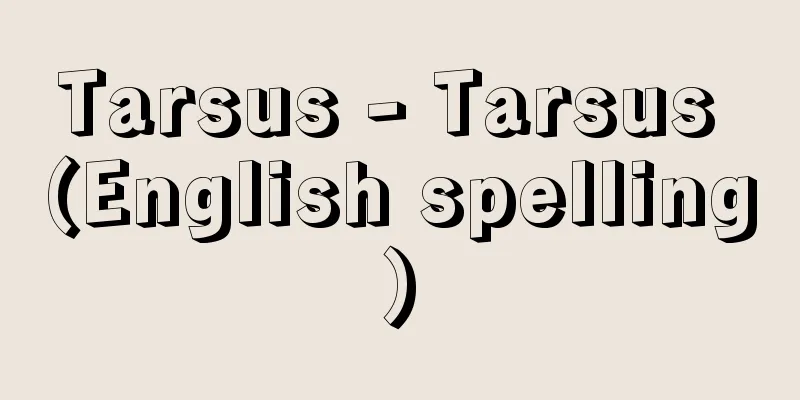Tarsus - Tarsus (English spelling)

|
A city in Icher Province in the south-central part of the Asia Minor Peninsula in Turkey. It is located 35 km west of the region's capital, Adana, and 15 km inland from the Mediterranean Sea. It has a population of 216,382 (2000). It distributes agricultural products such as wheat and cotton, and has developed spinning and flour milling industries. It is also a key transportation hub, as it is the base of the road (ancient Cilician Gate) that crosses the Taurus Mountains. On the northern outskirts of town is a famous waterfall where Alexander the Great is said to have bathed, and nearby there is also the building of Turkey's first hydroelectric power plant, built in 1902. [End line] historyIt was first built by indigenous people in ancient times, and occupied a key transportation location connecting Syria with the eastern coast of the Aegean Sea, and the eastern Mediterranean with the southern coast of the Black Sea, and accepted Greek immigrants from the 11th to 7th centuries BC. From the second half of the 6th century BC, it came under Persian control, and during the Hellenistic period it belonged to the Kingdom of Syria. It was conquered by Pompey in 66 BC, and from around 72 AD it became the capital of the Roman province of Cilicia, prospering through linen manufacturing. It is known as the town where Mark Antony and Cleopatra first met in 41 BC, and a city gate called the Cleopatra Gate remains. It is also known as the birthplace of the Christian apostle Paul. It was called Tarsus by the Greeks and Tarsus by the Romans. [Shoji Kiyonaga] Source: Shogakukan Encyclopedia Nipponica About Encyclopedia Nipponica Information | Legend |
|
トルコの小アジア半島中南部、イチェル県にある都市。この地方の中心都市アダナの西方35キロメートルに位置し、地中海から15キロメートルの内陸にある。人口21万6382(2000)。小麦、綿などの農産物を集散し、紡績業、製粉業が発達する。トロス山脈を横断する道路(古代のキリキア門)の基点にあたる交通の要衝でもある。北の町はずれにはアレクサンドロス大王も水浴したという著名な滝があり、その付近には1902年にトルコで最初に建設された水力発電所の建物も現存する。 [末尾至行] 歴史古代にまず先住民によって建設され、シリアとエーゲ海東岸、地中海東部と黒海南岸を結ぶ交通上の要地を占め、紀元前11~前7世紀にギリシア人の移民を受け入れた。前6世紀の後半以降、ペルシアの支配下に入り、ヘレニズム時代にはシリア王国に属し、前66年にポンペイウスに征服され、紀元後72年ごろからローマの属州キリキアの首府になり、亜麻(あま)布製造で繁栄した。前41年にマルクス・アントニウスとクレオパトラが初めて相会した町として知られ、クレオパトラ門という名の城門が残っている。またキリスト教の使徒パウロ生誕の町としても知られる。ギリシア人はタルソス、ローマ人はタルススとよんだ。 [清永昭次] 出典 小学館 日本大百科全書(ニッポニカ)日本大百科全書(ニッポニカ)について 情報 | 凡例 |
Recommend
Arachidonic acid - Arakidonsan
A type of unsaturated fatty acid with four double...
《Strange Shop》
…He was one of the first choreographers to adapt ...
Cantharidine
…Species such as the false longhorn beetle Xantho...
Ichikawa stop - Ichikawa stop
...After this, in 1924, Hagiwara Masaga invented ...
Kaleidoscope
A control panel that allows you to freely customiz...
Julio-Claudian dynasty - Julius-Claudian dynasty
The family name of the first 5 Roman emperors. The...
Candida
A genus of fungi and fungi imperfecti. It grows by...
Yoshitada Ashikaga
⇒ Ashikaga Yoshitane Source: Kodansha Digital Japa...
Ogieroyuu
Head of the Ogie-bushi school, which branched off ...
Sanbai
〘 noun 〙 (It is said that this is a further variat...
Anti-corrosive paint (rust-preventive paint, rust-preventive paint) - Sabusodometoryou (English spelling) anti-corrosive coating
Paint that inhibits the progression of rust. It is...
Śmiały (English spelling) Smialy
…The ruined Gniezno was abandoned, and the Polish...
Octopus
A colloquial term for callus, referring to locali...
streptomycin
C 21 H 39 N 7 O 12 (581.57). An aminoglycoside an...
Hui-tong-he; Hui-t`ung-ho
The name of the Grand Canal of China, which is par...









